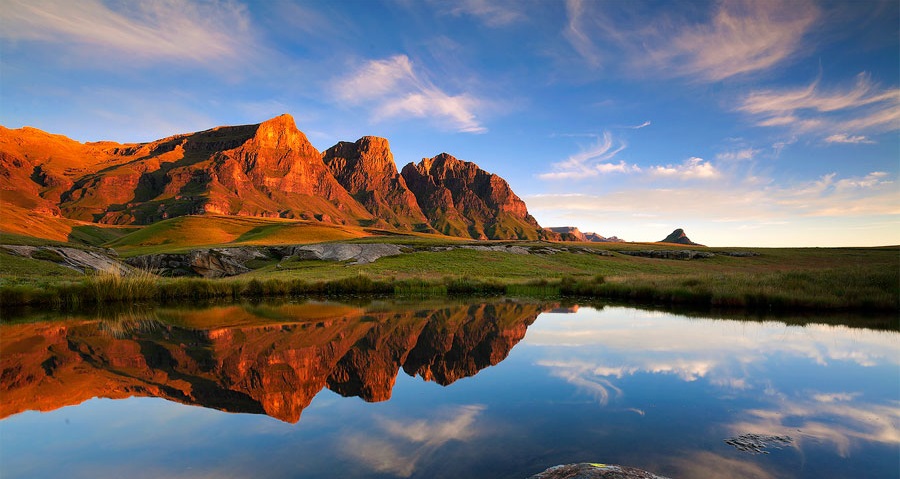10 Trendy Nigerian Hairstyles
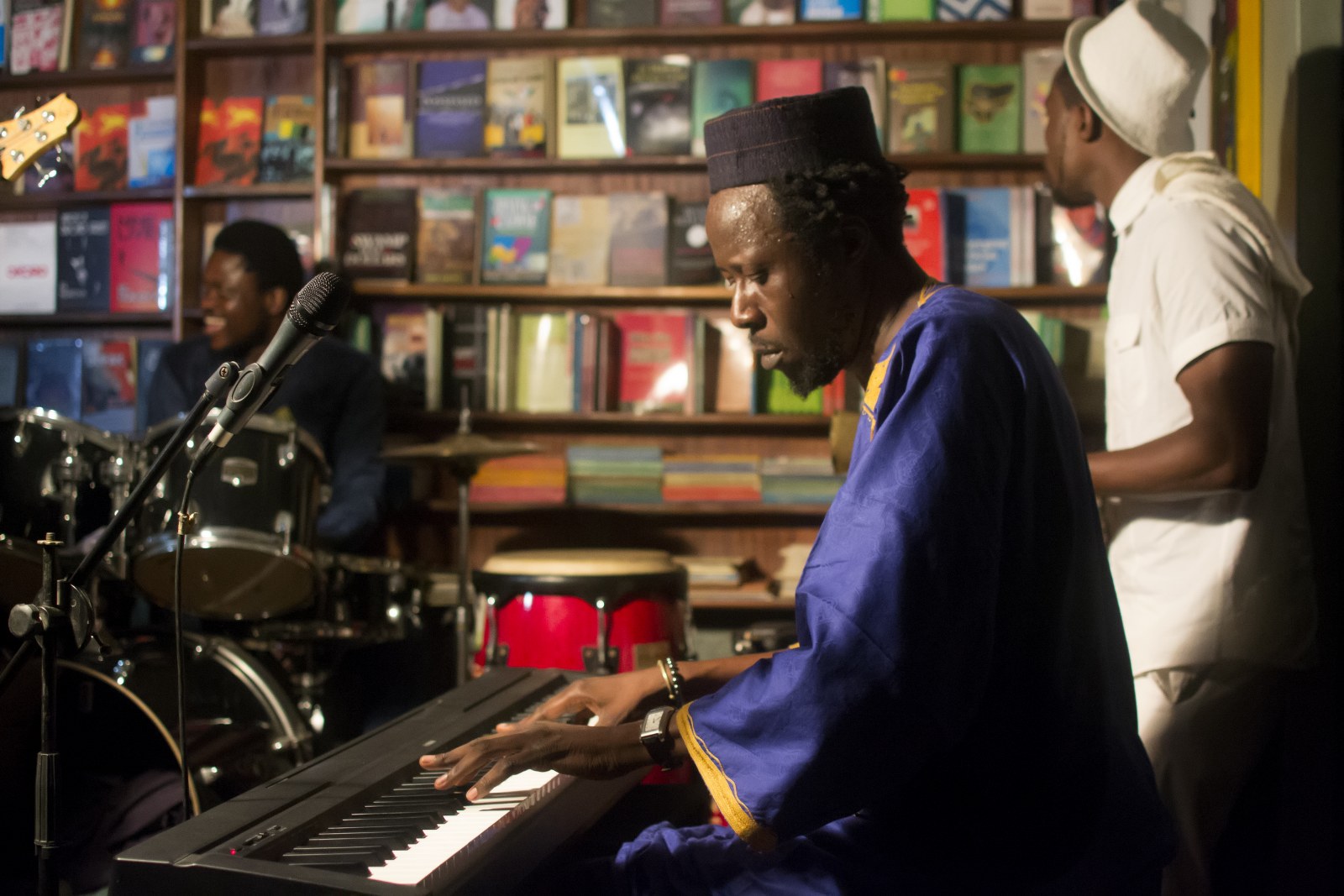
Like clothes, shoes and other fashion accessories, Nigerian hairstyles have evolved through the years. With the Nigerian fashion industry growing like wildfire, hairstyles have become a fashion statement. Nigerian women wore their hairstyles in Afro, Mats, puff puff, and the likes done with thick black 'made in China' threads and these styles were accompanied with lots of pains especially when freshly done.These Nigerian hairstyles seem to be fading away with the advent of modernization and westernization in form of weave extensions nevertheless the older trends are back but in sleeker versions.
 Nigerian hairstyles are specific, extraordinary and sometimes pretty elaborate. Worn by the women as a crown they are quite captivating and complicated. Hairstyle for Nigerian women is much more than self-perception. It is a medium of self-expression and helps to build confidence among their folks.Recently recognized in the foreign scenes these styles have become a source of income to the hairstylists and a fashion trend. In choosing hairstyles the following should be considered. How long it would take to make the hair, the hairstyle that fits the specific face structure, as well as the texture of the hair. Whether curled up, relaxed or braided Nigerian women are no doubt stylish with their hairstyles.
Nigerian hairstyles are specific, extraordinary and sometimes pretty elaborate. Worn by the women as a crown they are quite captivating and complicated. Hairstyle for Nigerian women is much more than self-perception. It is a medium of self-expression and helps to build confidence among their folks.Recently recognized in the foreign scenes these styles have become a source of income to the hairstylists and a fashion trend. In choosing hairstyles the following should be considered. How long it would take to make the hair, the hairstyle that fits the specific face structure, as well as the texture of the hair. Whether curled up, relaxed or braided Nigerian women are no doubt stylish with their hairstyles.

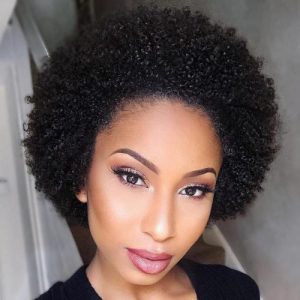
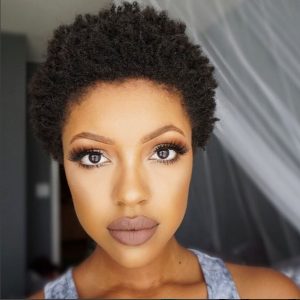 Back in time, Nigerian women would rock their hair in Afro style. Leaving the hair to stand all curled up and kinky. Like every other trend, this is finding its way back. Younger women and older ones alike are beginning to embrace their fro. Even on the runway, this afro kinky style is showcased thereby promoting the beauty of the typical African woman. Whether packed in a bun, left out or styled in a specific way this style appreciates the Nigerian woman's nappy hair.
Back in time, Nigerian women would rock their hair in Afro style. Leaving the hair to stand all curled up and kinky. Like every other trend, this is finding its way back. Younger women and older ones alike are beginning to embrace their fro. Even on the runway, this afro kinky style is showcased thereby promoting the beauty of the typical African woman. Whether packed in a bun, left out or styled in a specific way this style appreciates the Nigerian woman's nappy hair.
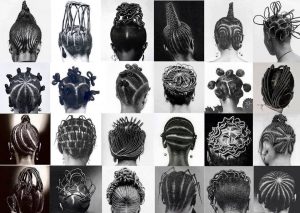 Braided styles come in different varieties. Women often make Side braids, buns, waterfall hairstyles with braids, tight braids and loose braids. Braid styles are very popular in Nigeria. Especially the curly crown a modern and stylish hairstyle which looks beautiful with naturally curly hair.Cornrows are traditional styles of braiding the hair close to the scalp. Braided naturally or with attachments, these styles go way back and have made its way back in a much stylish variety. From didi to shuku and patewo these Nigerian hairstyles are quite beautiful. Recently it has been made to look sleeker and relatable by adding attachments, wools, yarns and the likes.
Braided styles come in different varieties. Women often make Side braids, buns, waterfall hairstyles with braids, tight braids and loose braids. Braid styles are very popular in Nigeria. Especially the curly crown a modern and stylish hairstyle which looks beautiful with naturally curly hair.Cornrows are traditional styles of braiding the hair close to the scalp. Braided naturally or with attachments, these styles go way back and have made its way back in a much stylish variety. From didi to shuku and patewo these Nigerian hairstyles are quite beautiful. Recently it has been made to look sleeker and relatable by adding attachments, wools, yarns and the likes.
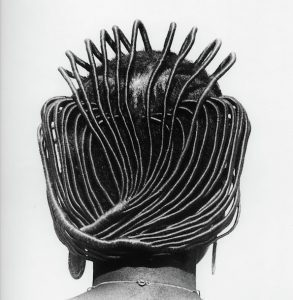
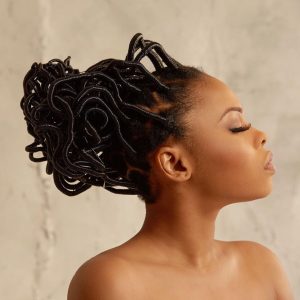 Before the emergence of faux locs, Indigenous Nigerian women would use 'made in China' threads to make their hair. This style though stressful and very painful was considered as a hair growth regimen by many. As years went by, using wool was adopted, though not as painful as using threads it has proven to be heavier and much more difficult to maintain. This style is specifically good for natural thick and curly hair as it softens the hair's hard texture. Curled up in a variety of styles this hairstyle was go-to for beautiful women. Depending on the length of the hair this style could be worn short or long and styled.
Before the emergence of faux locs, Indigenous Nigerian women would use 'made in China' threads to make their hair. This style though stressful and very painful was considered as a hair growth regimen by many. As years went by, using wool was adopted, though not as painful as using threads it has proven to be heavier and much more difficult to maintain. This style is specifically good for natural thick and curly hair as it softens the hair's hard texture. Curled up in a variety of styles this hairstyle was go-to for beautiful women. Depending on the length of the hair this style could be worn short or long and styled.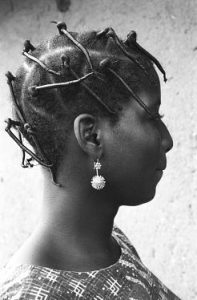

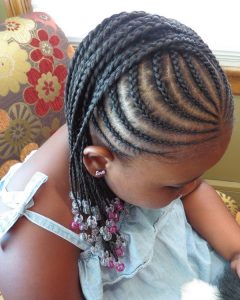
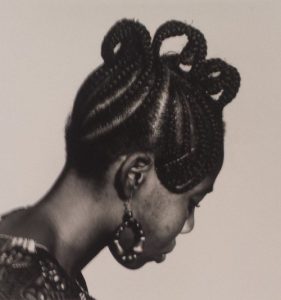 This Nigerian hairstyle has advanced through the years, it is worn mostly by younger girls especially children of Primary school and secondary school age as adding attachments to school is mostly prohibited. It is also appreciated by the older women and youths alike. The ease of making it as well as the cost makes it a go-to hairstyle for women. Fun names are used to describe this styles like didi, shuku, patewo, all back and most often adorned with beads for the kids.
This Nigerian hairstyle has advanced through the years, it is worn mostly by younger girls especially children of Primary school and secondary school age as adding attachments to school is mostly prohibited. It is also appreciated by the older women and youths alike. The ease of making it as well as the cost makes it a go-to hairstyle for women. Fun names are used to describe this styles like didi, shuku, patewo, all back and most often adorned with beads for the kids.
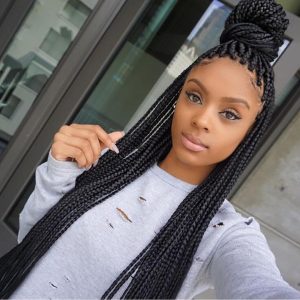
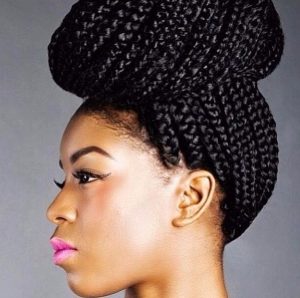
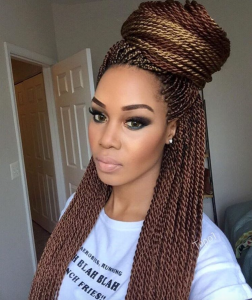 Call it protective style, Bob Marley, box braids, million braids, this Hairstyle has been worn by almost all Nigerian women. Box braids, Loose braids, feathers, long or short this style can be made according to preferred size and length. Based on how long, how much, the size and skills of the stylist this style can take 6 hours to a day to make. This style can be worn for more than 2 months. With the growth in fashion industry and trend, this style has been made into wigs saving women the stress of sitting in the salon for hours.The braid styles have evolved so much that different methods are being used to make them. It can be made with Brazilian wool, crochet or kinky. It can also be made colorfully and styled to taste.
Call it protective style, Bob Marley, box braids, million braids, this Hairstyle has been worn by almost all Nigerian women. Box braids, Loose braids, feathers, long or short this style can be made according to preferred size and length. Based on how long, how much, the size and skills of the stylist this style can take 6 hours to a day to make. This style can be worn for more than 2 months. With the growth in fashion industry and trend, this style has been made into wigs saving women the stress of sitting in the salon for hours.The braid styles have evolved so much that different methods are being used to make them. It can be made with Brazilian wool, crochet or kinky. It can also be made colorfully and styled to taste.
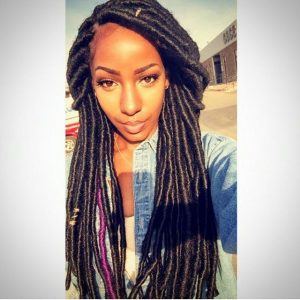
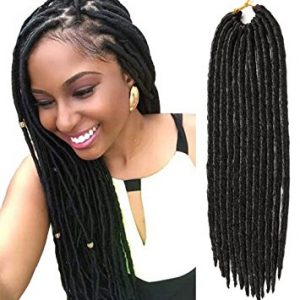 Faux Locs is known to give the wearer a great self-confidence and beautiful look. Because it can be used for a long time, Faux locs is known to help with hair growth and good hair maintenance.
Faux Locs is known to give the wearer a great self-confidence and beautiful look. Because it can be used for a long time, Faux locs is known to help with hair growth and good hair maintenance.
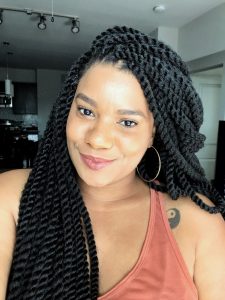
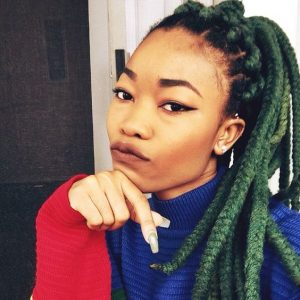
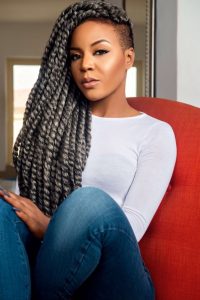 Be it braided or wrapped into a yarn to resemble faux locs, this is one of the most loved Nigerian hairstyles. The stylists make use of Brazillian wool or Kneading wool which often comes in different colours. Because of its light weight and affordable price range, women who can't keep up with the faux locs trend opt for it. It takes about 3 hours to style and can last for more than a month. Asides making them into locs it can be made into yarn twists or braids.
Be it braided or wrapped into a yarn to resemble faux locs, this is one of the most loved Nigerian hairstyles. The stylists make use of Brazillian wool or Kneading wool which often comes in different colours. Because of its light weight and affordable price range, women who can't keep up with the faux locs trend opt for it. It takes about 3 hours to style and can last for more than a month. Asides making them into locs it can be made into yarn twists or braids.
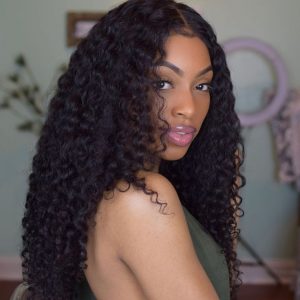
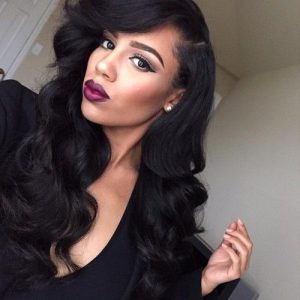
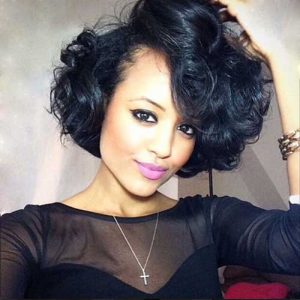 With the emergence of styles and trends, hairstyles in Nigeria can be said to be influenced by the western culture. Some people invest in hair extensions which are quite expensive but beautiful nonetheless. This styles can be short, Medium or full stretch long. It can also be sleeky, curly or wavy. 100% human hair, virgin hair, Brazilian and Peruvian hair as well as the synthetic hair is no doubt part of the Nigerian hairstyles. It takes up to 45 minutes to style depending on the length or stylist. Ironically the short pixie cut takes a longer time to make because of the process.
With the emergence of styles and trends, hairstyles in Nigeria can be said to be influenced by the western culture. Some people invest in hair extensions which are quite expensive but beautiful nonetheless. This styles can be short, Medium or full stretch long. It can also be sleeky, curly or wavy. 100% human hair, virgin hair, Brazilian and Peruvian hair as well as the synthetic hair is no doubt part of the Nigerian hairstyles. It takes up to 45 minutes to style depending on the length or stylist. Ironically the short pixie cut takes a longer time to make because of the process.
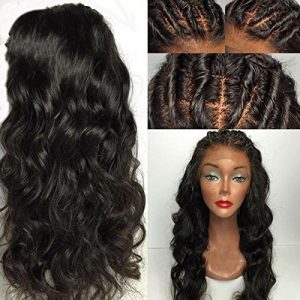
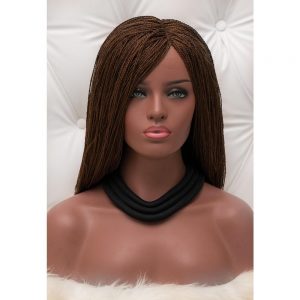 Wigs have also become really trendy in the Nigerian fashion market. Comfortable, affordable and stress-free, wigs save most Nigerian women the stress of visiting the salon. Whether made into braids or with the extensions even as Ghana weavings, wigs helps to keep the natural hair aerated and prevents itching. It has become every woman's go-to for a quick fix, especially on a bad hair day. Some wigs are so naturally made it could be confused with the main fix. They may be quite expensive but they last for an incredibly long time.
Wigs have also become really trendy in the Nigerian fashion market. Comfortable, affordable and stress-free, wigs save most Nigerian women the stress of visiting the salon. Whether made into braids or with the extensions even as Ghana weavings, wigs helps to keep the natural hair aerated and prevents itching. It has become every woman's go-to for a quick fix, especially on a bad hair day. Some wigs are so naturally made it could be confused with the main fix. They may be quite expensive but they last for an incredibly long time.
 Nigerian hairstyles are specific, extraordinary and sometimes pretty elaborate. Worn by the women as a crown they are quite captivating and complicated. Hairstyle for Nigerian women is much more than self-perception. It is a medium of self-expression and helps to build confidence among their folks.Recently recognized in the foreign scenes these styles have become a source of income to the hairstylists and a fashion trend. In choosing hairstyles the following should be considered. How long it would take to make the hair, the hairstyle that fits the specific face structure, as well as the texture of the hair. Whether curled up, relaxed or braided Nigerian women are no doubt stylish with their hairstyles.
Nigerian hairstyles are specific, extraordinary and sometimes pretty elaborate. Worn by the women as a crown they are quite captivating and complicated. Hairstyle for Nigerian women is much more than self-perception. It is a medium of self-expression and helps to build confidence among their folks.Recently recognized in the foreign scenes these styles have become a source of income to the hairstylists and a fashion trend. In choosing hairstyles the following should be considered. How long it would take to make the hair, the hairstyle that fits the specific face structure, as well as the texture of the hair. Whether curled up, relaxed or braided Nigerian women are no doubt stylish with their hairstyles.
1. Afro


 Back in time, Nigerian women would rock their hair in Afro style. Leaving the hair to stand all curled up and kinky. Like every other trend, this is finding its way back. Younger women and older ones alike are beginning to embrace their fro. Even on the runway, this afro kinky style is showcased thereby promoting the beauty of the typical African woman. Whether packed in a bun, left out or styled in a specific way this style appreciates the Nigerian woman's nappy hair.
Back in time, Nigerian women would rock their hair in Afro style. Leaving the hair to stand all curled up and kinky. Like every other trend, this is finding its way back. Younger women and older ones alike are beginning to embrace their fro. Even on the runway, this afro kinky style is showcased thereby promoting the beauty of the typical African woman. Whether packed in a bun, left out or styled in a specific way this style appreciates the Nigerian woman's nappy hair.
2. Braids
 Braided styles come in different varieties. Women often make Side braids, buns, waterfall hairstyles with braids, tight braids and loose braids. Braid styles are very popular in Nigeria. Especially the curly crown a modern and stylish hairstyle which looks beautiful with naturally curly hair.Cornrows are traditional styles of braiding the hair close to the scalp. Braided naturally or with attachments, these styles go way back and have made its way back in a much stylish variety. From didi to shuku and patewo these Nigerian hairstyles are quite beautiful. Recently it has been made to look sleeker and relatable by adding attachments, wools, yarns and the likes.
Braided styles come in different varieties. Women often make Side braids, buns, waterfall hairstyles with braids, tight braids and loose braids. Braid styles are very popular in Nigeria. Especially the curly crown a modern and stylish hairstyle which looks beautiful with naturally curly hair.Cornrows are traditional styles of braiding the hair close to the scalp. Braided naturally or with attachments, these styles go way back and have made its way back in a much stylish variety. From didi to shuku and patewo these Nigerian hairstyles are quite beautiful. Recently it has been made to look sleeker and relatable by adding attachments, wools, yarns and the likes.
3. Thread

 Before the emergence of faux locs, Indigenous Nigerian women would use 'made in China' threads to make their hair. This style though stressful and very painful was considered as a hair growth regimen by many. As years went by, using wool was adopted, though not as painful as using threads it has proven to be heavier and much more difficult to maintain. This style is specifically good for natural thick and curly hair as it softens the hair's hard texture. Curled up in a variety of styles this hairstyle was go-to for beautiful women. Depending on the length of the hair this style could be worn short or long and styled.
Before the emergence of faux locs, Indigenous Nigerian women would use 'made in China' threads to make their hair. This style though stressful and very painful was considered as a hair growth regimen by many. As years went by, using wool was adopted, though not as painful as using threads it has proven to be heavier and much more difficult to maintain. This style is specifically good for natural thick and curly hair as it softens the hair's hard texture. Curled up in a variety of styles this hairstyle was go-to for beautiful women. Depending on the length of the hair this style could be worn short or long and styled.
4. Weaving Hairstyles


 This Nigerian hairstyle has advanced through the years, it is worn mostly by younger girls especially children of Primary school and secondary school age as adding attachments to school is mostly prohibited. It is also appreciated by the older women and youths alike. The ease of making it as well as the cost makes it a go-to hairstyle for women. Fun names are used to describe this styles like didi, shuku, patewo, all back and most often adorned with beads for the kids.
This Nigerian hairstyle has advanced through the years, it is worn mostly by younger girls especially children of Primary school and secondary school age as adding attachments to school is mostly prohibited. It is also appreciated by the older women and youths alike. The ease of making it as well as the cost makes it a go-to hairstyle for women. Fun names are used to describe this styles like didi, shuku, patewo, all back and most often adorned with beads for the kids.
5. Ghana weaving
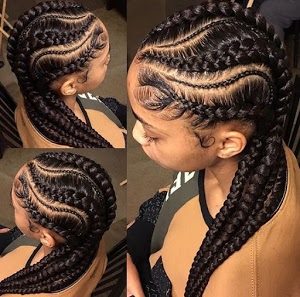
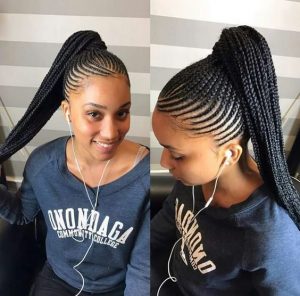
Whether weaved to the back or upwards, straight or spiraling this hairstyle took the regular patewo and shuku or all back worn by Nigerian women in times past; revamped and renewed it to a sleeker and more trendy form. Globally accepted now, This Nigerian hairstyle is rocked by every woman that loves her hair and loves to trend. Made with either wool or regular attachments you'd be sure to spend 2 to 4 hours in the salon. Also depending on the hair texture, it can be last 3 weeks to 1 month.
6. Classic African braids


 Call it protective style, Bob Marley, box braids, million braids, this Hairstyle has been worn by almost all Nigerian women. Box braids, Loose braids, feathers, long or short this style can be made according to preferred size and length. Based on how long, how much, the size and skills of the stylist this style can take 6 hours to a day to make. This style can be worn for more than 2 months. With the growth in fashion industry and trend, this style has been made into wigs saving women the stress of sitting in the salon for hours.The braid styles have evolved so much that different methods are being used to make them. It can be made with Brazilian wool, crochet or kinky. It can also be made colorfully and styled to taste.
Call it protective style, Bob Marley, box braids, million braids, this Hairstyle has been worn by almost all Nigerian women. Box braids, Loose braids, feathers, long or short this style can be made according to preferred size and length. Based on how long, how much, the size and skills of the stylist this style can take 6 hours to a day to make. This style can be worn for more than 2 months. With the growth in fashion industry and trend, this style has been made into wigs saving women the stress of sitting in the salon for hours.The braid styles have evolved so much that different methods are being used to make them. It can be made with Brazilian wool, crochet or kinky. It can also be made colorfully and styled to taste.
7. Locs Braids
This form of braids is known to be installed by expertise mostly specialized in Natural hair. It is trendy and comes with a special feeling. Used not just as a protective style, faux locs helps in hair growth, especially for the natural hair folks. It takes a lot to maintain this style especially if it is being considered to be worn long term. The stylist takes up to 4 hours to install this style with regard to how long it would be worn. This style can last from a month to a year depending on the stylist and the materials used.
 Faux Locs is known to give the wearer a great self-confidence and beautiful look. Because it can be used for a long time, Faux locs is known to help with hair growth and good hair maintenance.
Faux Locs is known to give the wearer a great self-confidence and beautiful look. Because it can be used for a long time, Faux locs is known to help with hair growth and good hair maintenance.
8. Wool


 Be it braided or wrapped into a yarn to resemble faux locs, this is one of the most loved Nigerian hairstyles. The stylists make use of Brazillian wool or Kneading wool which often comes in different colours. Because of its light weight and affordable price range, women who can't keep up with the faux locs trend opt for it. It takes about 3 hours to style and can last for more than a month. Asides making them into locs it can be made into yarn twists or braids.
Be it braided or wrapped into a yarn to resemble faux locs, this is one of the most loved Nigerian hairstyles. The stylists make use of Brazillian wool or Kneading wool which often comes in different colours. Because of its light weight and affordable price range, women who can't keep up with the faux locs trend opt for it. It takes about 3 hours to style and can last for more than a month. Asides making them into locs it can be made into yarn twists or braids.
9. Fixing


 With the emergence of styles and trends, hairstyles in Nigeria can be said to be influenced by the western culture. Some people invest in hair extensions which are quite expensive but beautiful nonetheless. This styles can be short, Medium or full stretch long. It can also be sleeky, curly or wavy. 100% human hair, virgin hair, Brazilian and Peruvian hair as well as the synthetic hair is no doubt part of the Nigerian hairstyles. It takes up to 45 minutes to style depending on the length or stylist. Ironically the short pixie cut takes a longer time to make because of the process.
With the emergence of styles and trends, hairstyles in Nigeria can be said to be influenced by the western culture. Some people invest in hair extensions which are quite expensive but beautiful nonetheless. This styles can be short, Medium or full stretch long. It can also be sleeky, curly or wavy. 100% human hair, virgin hair, Brazilian and Peruvian hair as well as the synthetic hair is no doubt part of the Nigerian hairstyles. It takes up to 45 minutes to style depending on the length or stylist. Ironically the short pixie cut takes a longer time to make because of the process.
10. Wigs

 Wigs have also become really trendy in the Nigerian fashion market. Comfortable, affordable and stress-free, wigs save most Nigerian women the stress of visiting the salon. Whether made into braids or with the extensions even as Ghana weavings, wigs helps to keep the natural hair aerated and prevents itching. It has become every woman's go-to for a quick fix, especially on a bad hair day. Some wigs are so naturally made it could be confused with the main fix. They may be quite expensive but they last for an incredibly long time.
Wigs have also become really trendy in the Nigerian fashion market. Comfortable, affordable and stress-free, wigs save most Nigerian women the stress of visiting the salon. Whether made into braids or with the extensions even as Ghana weavings, wigs helps to keep the natural hair aerated and prevents itching. It has become every woman's go-to for a quick fix, especially on a bad hair day. Some wigs are so naturally made it could be confused with the main fix. They may be quite expensive but they last for an incredibly long time.
